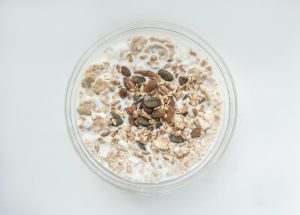Health
The 4 Seasons of Each Day
 While many people are preoccupied with what foods are good for them, what foods are “bad,” and which exercise is ideal, from a Chinese medical perspective it is easier to simplify: The more we live according to the Dao (the scientific way of nature), the less ailments we will have. The less we live with the Dao, the more ailments we will have.
While many people are preoccupied with what foods are good for them, what foods are “bad,” and which exercise is ideal, from a Chinese medical perspective it is easier to simplify: The more we live according to the Dao (the scientific way of nature), the less ailments we will have. The less we live with the Dao, the more ailments we will have.
One Daoist, and subsequently Chinese medical principle is that each individual day contains within it the same seasonal arc that we experience in each year. Obviously, this does not mean that every day in January and February around 12 noon the temperature visits 80 degrees (though wouldn’t that be nice? But confusing). The arc is relative.
The morning hours correspond with the mechanisms and principles of spring. Rise and shine. “Plant seeds” for the day, in the form of a healthy breakfast and possibly setting one’s intentions. If you truly don’t have time for a good breakfast during the week, try to have an earlier lunch and be sure to do so on weekends. Morning is a good time for exercise, but not as ideal as mid-day, nicknamed “Tai Yang,” most yang and/or high noon.
Mid-day corresponds with summer. It is when most people have the most energy, hence it is the time to be most physically active. Since Chinese medicine views most parts of the body from a “use it or lose it” perspective, the less disciplined we are about engaging in at least some movement during the Tai Yang hours (11am-3pm), the weaker we will become. Again, if this is challenging during the work week, I recommend finding and committing to 15-minute windows, then “realer” workouts on weekends.
Sunset to nighttime obviously equates with autumn and winter, hence regenerating and restoring, winding down until sleep. This parallel is the one with an apparent hole in logic, as we recommend eating more calories in the winter than summer, but more during the day than at night when the body is relatively more insulin resistant. My understanding is the premise is more applicable to activity than caloric consumption, and principles of relativity still apply. Eat smaller meals for dinner in summer than in winter and remain restful at this time during all seasons. If you enjoy going out and indulging with friends once or twice a week or once or twice a month, by all means do so, but follow a more Daoist schedule on all other days.
In my opinion, there is actually virtue to a lot of “gimmick diets,” abstinences, and new age health regiments. However, in thousands of years, neither the human body nor nature has changed very much. If it had our medicine would be rendered wholly ineffective. Follow the Dao.
Go to sleep at a healthy bedtime, eat a healthy breakfast, exercise at mid-day.
Eat cooler foods and less foods in summer—warmer and more foods in winter.
Minimize indulgences, stress, and reductionist medicines.
Breakfast Congee Ideas

For anyone who is vegan, sensitive to eggs, or just dislikes them, here is a breakfast idea I’ve been experimenting with, both for the sake of variety and, well… experimentation.
In China, (white) rice congee is a common breakfast, often with egg and pickled vegetables, although I realize in the States rice is rather vilified for being a simple carb and high on the glycemic index. While this might be the case, it is also a food that is very gentle on the stomach and internal organs, which from our perspective aids in absorption and digestion, and in the proper dosages can be beneficial. However, for those who can’t get past the glycemic index, I recommend using quinoa, millet, or amaranth.
1 cup of your grain of choice
5 cups of liquid (if you’re going to make the sweeter, I recommend some kind of dairy-free milk—if you’re going for the probably healthier, more Oriental style I recommend just water or either vegetable, beef, or chicken broth) Oils don’t mix as well with the sweet flavors so if you’re making the sweeter version be sure to stir often so as to avoid sticking to the pot.
Boil and simmer about 15-25 minutes, or until it is the consistency of porridge.
Treat the sweet version like you would oatmeal: Top with berries, granola, as little maple syrup as you can discipline yourself to, cinnamon, and/or nuts if you like.
For the Asian version I recommend leftover vegetables and/or pickled cabbage or kraut. Plus, an over-easy or boiled egg if you want the best of all worlds.
Enjoy warm if possible! For those of us with babies or toddlers, we long for the days when we will return to eating hot food.
Whatever you eat, EAT BREAKFAST. I cannot stress this enough. They said breakfast is the most important meal of the day because it is, not because grandma said it, but because science and biology do. Here is a link to an NIH study correlating the skipping of breakfast with increased insulin resistance and risk for diabetes: https://www.ncbi.nlm.nih.gov/pmc/articles/PMC7246451/
I like coffee as much as anyone, but coffee alone (or with a piece of toast) is not breakfast. Protein and/or fat should be consumed, preferably in great quantity.
Nor do I doubt the potential benefits of intermittent fasting, but it is more biologically aligned to skip dinner—not breakfast. If this is impossible, maybe a later breakfast, like 9am? Supposedly, any longer than 2-3 hours after waking constitutes “skipping breakfast,” which is to say the insulin resistant mechanism is set in motion by that time.
If you have no appetite for breakfast this probably indicates your dinner being not fully digested and some metabolic syndrome at work. Please reach out—or try licorice and/or ginger tea 🙂


